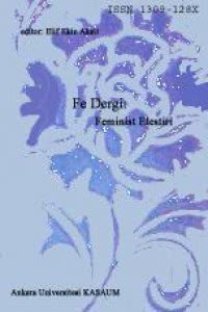Mitik Kadın Temsilinin Mitolojik Unsurlardan Arındırılması: Antik Hikayelerin Eleştirel Bakış Açısıyla Yeniden Tasavvur Edilmesi
Eril ideolojinin mimarı olarak bilinen Antik Yunan Mitolojisi, dünya çapında her kadının her çağda yüzleşmeye ve yaşamaya maruz bırakıldığı durumun gerçek bir resmini sunar. Geleneksel felsefenin fosilleşmiş fikirleriyle beslenen mitolojik anlatılar, cinsiyetler arasındaki kutuplaşmayı ortaya çıkaran, içselleştiren ve meşrulaştıran bir düzenin tam da merkezinde yer alır. Her ne kadar mazide kurgulanmış ve bitmiş gibi görünse de, mitolojik olaylar ve karakterler günümüzü yansıtmaktadır: geçmişten günümüze menfi kadın algısıyla ilgili olarak hiçbir şey değişmemiştir. Bu makale, erkek eliyle yazılmış hikayelere razı gelmeyip kendi gerçeklerini yazmasına olanak sağlayacak saklı güçlerini keşfetmek üzere kadınları uyanışa geçiren feminist yazar Cixous’nun yankılarını taşır. Bu doğrultuda, bu çalışmada mitolojik hikayeler, ataerkil ve fallus merkezli düzenin dinamiklerini altüst etmek amacıyla feminist bakış açısıyla yeniden tasavvur edilecektir.
Anahtar Kelimeler:
toplumsal cinsiyet kalıpları, ataerkil ideoloji, fallosantrizm, Helene Cixous, klasik mitoloji
Demythologization of the Mythic Representation of Woman: Critical Reimagining of the Archaic Stories
Ancient Greek myths, as the architect of the patriarchal ideology, serve as a panorama of the reality, which women in all ages around the world face and are forced to experience. Based on the fossilized ideas of the archaic philosophy, the mythological narratives are at the center of a canon which reveals, internalizes and legitimates the binary oppositions between the sexes. Although myths are set in the past and thus seem to be bygone, the events and characters still mirror the modern age: nothing seems to have changed concerning the negative perception of womanhood. This essay does echo the feminist writer Cixous’s challenge to awaken all women to discover their own power by not yielding to man-made stories but writing their own realities. In this direction in this study, the classical myths are reimagined from postfeminist perspective with the purpose of subverting the dynamics of patriarchy and phallocentrism.
___
- Cixous, Hélène. “The Laugh of the Medusa” Chicago Journals 1, no. 4 (1976): 875-893.
- Gabriel, Katherine Anne. Performing Femininity: Gender in Ancient Greek Myth. (Senior Projects. Bard Digital Commons, 2016).
- Hamilton, Edith. Mythology (New York, Boston, London: Back Bay Books/Little Brown and Company, 1988). Haynes, Natalie. Pandora’s Jar: Women in Greek Myths (Pan Macmillan. E-book, 2020).
- Hesiod. The World’s Classics: Theogony and Works and Days, trans. M. L. West ( New York and Oxford: Oxford University Press, 1988).
- Komar, Kathleen. Reclaiming Klytemnestra: Revenge or Reconciliation (University of Illinois Press, 2003). Lefkowitz, Mary. R. “Women in Greek Myth” The American Scholar 54, no. 2 (1985): 207-219.
- Lincoln, Bruce. “The Rape of Persephone: A Greek Scenario of Women’s Initiation” The Harward Theological Review 72, no. 3/4 (1979): 223-235.
- Ovid. (2000). The Metamorphoses. trans. A.S. Kline (2000).
- Raddeker, Helene. Bowen. Sceptical History: Feminist and Postmodern Approaches in Practice (London and New York: Routledge, 2007).
- Spelman, Elizabeth. Inessential Woman: Problems of Exclusion in Feminist Thought. (Boston: Beacon Press, 1988).
- Sultana, Mou. The Castration Complex for Freud between 1907 and 1909. (London: Routledge, 2018).
- Vallury, Rajeswari. S. Surfacing the Politics of Desire: Literature, Feminism and Myth. (Toronto: University of Toronto Press, 2008).
- Walcot, P. “Greek Attitudes towards Women: The Mythological Evidence” Greece&Rome. 31, no. 1 (1984): 37-47.
- Zajko, Vanda. and Leonard, Miriam. (eds.). Laughing with Medea: Classical Myth and Feminist Thought. Oxford: Oxford University Press, 2006).
- Zeitlin, Froma. I. “The Dynamics of Misogyny: Myth and Mythmaking in the Oresteia” Women in the Ancient World. Arethusa, Spring and Fall 11, no. 1/2 (1978): 149-184.
- ISSN: 1309-128X
- Yayın Aralığı: Yılda 2 Sayı
- Başlangıç: 2008
- Yayıncı: Ankara Üniversitesi KASAUM
Sayıdaki Diğer Makaleler
Levha-i Sıhhat: Geç Osmanlı Dönemi İstanbul’unda Tıbbi Bakımı Görselleştirmek
Türkiye’de Kadın Kooperatiflerinin Kadınların Güçlenmesine Etkisi
Aslı ŞAHANKAYA ADAR, Saniye DEDEOĞLU
Kadın, İşçi, Genç: Kadın İşçilerin Hayat Hikâyelerinde Gençlik Dönemi
